
NIkki Emerson

Ordinary People, Extraordinary Lives is a new series exclusive to Sainsbury's that tells the stories of ordinary people who have done things in their lives that others might consider 'extraordinary'. As one of the major Partners of the London 2012 Paralympics Sainsbury's supported me when I became an athlete after breaking my back in a car accident six years ago, so when they approached me about writing the first instalment for this series I was happy to tell my story. I don't consider myself to be in any way exceptional or more talented than anyone else out there. Anything 'extraordinary' I've achieved has been through hard work and a refusal to accept no for an answer. When I wrote the book these were the key messages I wanted to get across. Many people, including myself before the accident and even some disabled people I've met, think that being in a wheelchair or missing a limb means you must be limited in what you can achieve. I wanted to show people that actually most things can still be done if you really, really want to do them (an obvious exception being the Marathon des Sables which still eludes me - any suggestions on how to complete that in a wheelchair gratefully received!). I also wanted to try and inspire other disabled people, particularly children, to get active and healthy. It's harder to get fit when you're in a wheelchair because most sports need specialist equipment, but it's even more important to try and get out and do what you can as sitting down all day means wheelchair users are even more susceptible to obesity and diabetes than the general population.
Please tell us about the day of your crash.
I spent the morning of the crash staying with friends down at the coast after finishing my 2nd year at Oxford University, sunbathing and hanging out by the pool - and definitely not expecting what would happen later! I then drove back via Oxford to visit friends up North when my car skidded off the road just outside the city. It flipped over down a bank and hit a tree, which fell on the car and slammed my seat into the steering wheel. This is what broke my back. I spent 3 hours upside down in the car breathing through an oxygen mask while the firemen cut me out, during which it felt like my torso and legs were on fire and my chest was being crushed. I couldn't move my legs at all, so I knew I'd broken my back and was paralysed. Once they got me out I was taken to the John Radcliffe hospital in Oxford, where they gave me breathing tubes as a broken rib went through 1 of my lungs, and lots of painkillers as I had to wait a day for the operation to remove the broken pieces of vertebrae from my back and put a metal cage around my spine to stabilise it. Then I spent the rest of the day lying very still in bed under strict instruction not to move the little of my body I was still able to. My mum was told by the policemen who went to pick her up and bring her to the hospital that I might not make it, but it didn't feel like that to me at all - sadly no amazing 'life flashing before my eyes' moment to report!
Why were the athletes in the Beijing Paralympics so inspiring for you while you were in rehab?
I'd always thought of disabled people as immobile and dependent. Then I saw the wheelchair track athletes lined up to start racing the women's 5000m at the Paralympics and couldn't believe how much they looked like the athletes I'd seen in the Olympics, only kneeling in racing wheelchairs rather than on starting blocks. Then once they started racing it became clear that they were actually faster than the Olympic runners and every bit as ruthless and tactical as Tour de France cyclists with the way they raced in a peleton and squeezed through the smallest of gaps to get a win. From that point I was hooked! When I saw the interviews with the winners of the race I was also so impressed at how eloquent and humble they were too, and at the other things they had accomplished off the track, from advanced degrees to charity partnerships. During rehab one of my biggest concerns was whether I'd be able to finish my degree and still have the same career prospects as my contemporaries if I couldn't walk, but hearing the stories of athletes like Baroness Grey-Thompson, who has since been an incredible mentor to me, and Tatiana McFadden made me realise that being in a wheelchair definitely wouldn't limit my chances to achieve my goals.
Where did you find the courage and determination to move on?
I don't really see it as finding courage or determination, or as moving on. When you're told you're never going to walk again you have 2 choices: Give up, or keep going. Giving up wasn't even offered to me as an option by the friends, family and rehab staff I had supporting me through my time in the Stoke Mandeville National Spinal Injuries Unit, so I kept doing what I've always done - pick a goal, reach it, find a new one. I'm more of a big picture person anyway, tending to decide to do something without considering how I'm going to make it happen and then figuring it out as I go along, and I think this was a big help. I tried not to think about what it meant to be in a wheelchair (outside of my weekly sessions with the hospital psychologist) - my goals were to get back to Oxford before term started so I could still graduate with my friends and to become a Great Britain athlete. Learning to use a wheelchair was just a necessary step I had to get over to hit those targets.
What has been your favourite moment while competing?
That's a tough one! I have three, so in today's order (it changes depending on how nostalgic I'm feeling...):
- My first London Marathon - as a Londoner nothing can beat racing around the Capital's streets lined with thousands of people cheering, especially as I had only been out of hospital for a few months.
- My first ever race - Silverstone Half Marathon 2009. From that point on I was hooked!
- The first time I represented Great Britain. Wearing that iconic red, white and blue lycra felt pretty special!
What was your biggest struggle adapting to your new life?
The first time I went out for a friend's birthday and realised I couldn't dance anymore was terrible. It sounds like such a silly little thing but I still hate not being able to get up on the dance floor! It was easy to accept the big things like not being able to walk or feel my legs, but the reality that that also meant no dancing weirdly made reality hit home far more than wheeling around in my chair all day.
What advice would you give to someone who had been through something similar to you?
If someone tells you you can't do something DON'T LISTEN TO THEM. If it's something you want to do, give it a try. It doesn't matter if they're right, as long as you can laugh at yourself if you fail. I've fallen out of my chair so many times trying to take on steps that were a little high to bounce off, yet I got around a Tough Mudder course, abseiled down 1 of London's tallest buildings and swung across the Victoria Falls gorge. Nobody but you can really tell what you're capable of, and for me at least a bit of indignation at being underestimated always fuels my determination to prove people wrong.
What is next for you?
I'm currently Commercial Manager for EMEA at Tough Mudder, looking after our Tough Mudder and Mudderella brands, so next for me will be completing another Tough Mudder course and doing my first Mudderella this Summer. After years of sport being all about winning I love taking part in our events as they are so much tougher than any race I've ever done, but also so much more fun because they are all about teamwork and not competition. One day I aim to be the Commercial Director of the International Olympic Committee, so for the foreseeable future I'll be getting up at 5am to work out before putting in long hours to climb the career ladder!

